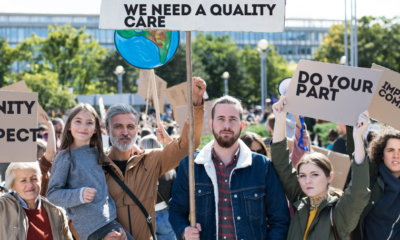Public Health
The Role of Spiritual Care in Residential Facilities

In the evolving landscape of healthcare and long-term care facilities, the significance of holistic care has increasingly come to the forefront. Residential facilities, whether for the elderly, individuals with disabilities, or those in palliative care, have long been structured around medical, psychological, and social support systems. However, one crucial aspect of holistic care that is often overlooked or under-emphasized is spiritual care. Spiritual care is the practice of addressing the existential, religious, and emotional needs of residents, contributing to their overall well-being. It is a fundamental component of comprehensive care, helping individuals find meaning, purpose, and peace in their lives.
This article explores the role of spiritual care in residential facilities, examining its impact on residents’ well-being, the responsibilities of spiritual caregivers, and the challenges in implementing effective spiritual care programs. It also discusses the importance of integrating spirituality into mainstream healthcare practices and highlights best practices from successful models.
Understanding Spiritual Care in Residential Facilities
Spiritual care is a broad concept that extends beyond religious practices to encompass a resident’s quest for meaning, inner peace, and connection with something greater than themselves. It is not limited to individuals with religious beliefs but applies to all people, regardless of faith or cultural background.
Defining Spiritual Care
- Providing emotional and existential support: Helping residents cope with issues related to suffering, aging, loneliness, and mortality.
- Facilitating religious practices: Ensuring that residents can engage in their religious rituals, prayers, and sacraments.
- Creating a sense of community: Encouraging social connections through shared spiritual experiences.
- Helping residents find purpose: Assisting individuals in discovering meaning in their lives, especially in challenging times.
The provision of spiritual care requires trained professionals, such as chaplains, pastoral counselors, or volunteers, who can engage residents in conversations about faith, morality, loss, and hope.
The Importance of Spiritual Care in Residential Facilities
Spiritual care is essential in long-term residential facilities for various reasons, including emotional support, mental health improvement, and enhanced quality of life.
- Addressing Emotional and Existential Distress
Many residents in long-term care facilities experience emotional distress due to aging, illness, loss of independence, or isolation from loved ones. These issues often lead to feelings of despair, anxiety, and depression. Spiritual care provides a sense of comfort and reassurance by helping residents navigate these emotional struggles.
For instance, elderly individuals may grapple with fears of death or regret over past life choices. A trained spiritual caregiver can offer guidance and support, encouraging them to reflect on their legacy, reconcile unresolved conflicts, and find inner peace.
- Enhancing Psychological Well-being
Studies have shown that spiritual practices such as prayer, meditation, and mindfulness can significantly improve mental health. Spiritual care encourages these practices, leading to:
- Reduced levels of anxiety and depression
- Greater resilience in dealing with illness and loss
- Improved sense of self-worth and dignity
Moreover, individuals who receive spiritual support often exhibit higher levels of hope and optimism, which positively impacts their recovery and overall health.
- Supporting End-of-Life Care
For residents in palliative care, spirituality becomes even more critical. Facing the end of life can be a daunting experience, and many individuals seek comfort in their faith or personal beliefs. Spiritual caregivers help residents prepare for death with dignity, offering guidance on issues like forgiveness, acceptance, and legacy.
In hospice care settings, chaplains and spiritual advisors often work closely with medical teams to ensure that residents receive compassionate, patient-centered care. Their presence can be comforting to both residents and their families, providing grief counseling and support during a difficult transition.
- Strengthening Community and Social Connection
Spiritual care fosters a sense of belonging among residents. Group religious services, prayer meetings, or spiritual discussions create opportunities for social interaction, reducing feelings of loneliness and isolation.
For instance, residents who share similar faith backgrounds can bond over common traditions and celebrations. Even for those without religious affiliations, group discussions on values, purpose, and mindfulness can create a sense of unity and mutual understanding.
Implementing Spiritual Care in Residential Facilities
Despite its importance, spiritual care is not always prioritized in residential settings. Integrating spiritual care into a facility’s framework requires a structured approach, including staff training, resource allocation, and a supportive environment.
- Training and Hiring Spiritual Caregivers
The presence of qualified spiritual caregivers is crucial for an effective program. Facilities should employ chaplains or pastoral care workers who can:
- Provide one-on-one counseling
- Organize religious and spiritual services
- Offer grief and bereavement support
- Act as a bridge between residents and their faith communities
In addition, care staff and nurses should receive training on recognizing residents’ spiritual needs and referring them to appropriate resources. Even if they are not trained chaplains, caregivers should be equipped with basic skills to listen compassionately and provide comfort.
- Creating a Multi-Faith Spiritual Care Program
- Since residential facilities house individuals from diverse backgrounds, spiritual care programs should be inclusive and adaptable. Some key elements of an inclusive program include:
- Multi-faith chapels or meditation spaces: Providing a neutral space where all residents can practice their faith or reflect in silence.
- Diverse religious services: Offering spiritual gatherings for different religious groups (Christian, Muslim, Jewish, Hindu, Buddhist, etc.).
- One-on-one spiritual counseling: Allowing residents to explore personal faith matters with trained chaplains or counselors.
Exclusivity ensures that no resident feels alienated due to their religious or spiritual beliefs.
- Encouraging Family Involvement
Spiritual care should not be limited to the facility: it should extend to family members as well. Encouraging families to participate in spiritual care activities, such as prayer sessions, religious ceremonies, or storytelling events, strengthens the resident’s sense of support.
Moreover, grief support for families after a resident’s passing can be an essential component of spiritual care, helping them process loss and find comfort.
- Integrating Spirituality with Medical Care
Healthcare providers should recognize the mind-body-spirit connection when treating residents. Studies show that addressing spiritual needs can lead to better health outcomes by:
- Reducing stress and promoting relaxation
- Improving pain management and coping mechanisms
- Enhancing adherence to treatment plans
Doctors, nurses, and caregivers should collaborate with spiritual advisors to create holistic care plans that address both physical and emotional well-being.
Challenges in Providing Spiritual Care
Despite its benefits, spiritual care faces several challenges in residential facilities:
- Lack of Trained Staff: Many facilities do not employ dedicated chaplains, leaving spiritual needs unmet.
- Diversity in Beliefs: Meeting the spiritual needs of a diverse population can be complex, requiring sensitive and inclusive approaches.
- Limited Resources: Budget constraints may prevent the hiring of full-time spiritual caregivers or the development of multi-faith spaces.
- Resistance from Residents or Staff: Some residents or staff members may not see the value of spiritual care, leading to reluctance in participation.
To overcome these challenges, facilities must prioritize education, advocacy, and policy changes to integrate spirituality into mainstream healthcare services.
Conclusion
Spiritual care plays a vital role in residential facilities by enhancing emotional well-being, providing comfort in times of distress, and fostering a sense of purpose and connection among residents. Whether through religious practices, one-on-one counseling, or community gatherings, spiritual care provides holistic support that complements medical and psychological care.
To fully realize the benefits of spiritual care, residential facilities must invest in trained caregivers, inclusive programs, and interdisciplinary collaboration. By recognizing the spiritual needs of residents, healthcare providers can offer compassionate, person-centered care that respects the dignity of every individual.
As the demand for holistic care grows, spiritual care will continue to be a cornerstone of comprehensive healthcare, ensuring that residents not only live comfortably but also find meaning and peace in their journey.
-

 Press Release7 days ago
Press Release7 days agoCrypto WINNAZ Launches First On-Chain Yield Engine for Meme Coins, Enabling 20x–300x Returns
-

 Press Release4 days ago
Press Release4 days agoBellarium ($BEL) Price Prediction: Could It Hit $5 by 2026?
-

 Press Release1 day ago
Press Release1 day agoClinical Trials Market Set for Robust Growth, Driven by Drug Development Surge and Digital Innovation
-

 Business3 days ago
Business3 days agoHow Managed IT Solutions Help Small Teams Compete at Enterprise Scale
-

 Press Release2 days ago
Press Release2 days agoFill-Finish Pharmaceutical Contract Manufacturing Market Expected to Flourish Amid Biopharmaceutical Boom and Global Outsourcing Trend by 2035
-

 Press Release2 days ago
Press Release2 days agoPreventive Vaccines Market to Witness Strong Growth by 2035
-

 Press Release2 days ago
Press Release2 days agoGreen Bio Chemicals Market Poised for Sustainable Growth amidst Global Shift to Eco-Friendly Alternatives by 2035
-

 Press Release2 days ago
Press Release2 days agoIndustrial Boiler Market Expected to Surpass USD 24.4 Billion by 2035 Amid Growing Demand for Energy Efficiency and Industrialization






























